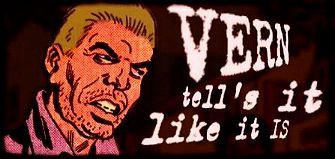There remain some bookcases here that need to be picked up by Monday. Contact here for details. Let’s make a deal! Everyone’s a winner!
Month / May 2007
“It is actually a very serious matter for finch lovers.”
One more finch tweeting post before I go – thanks for having me, Ed!
Okay, I’m Done
Those two posts below are my last for Return of the Reluctant. I’ve really, really enjoyed this. Thanks Ed for the opportunity! If any of you liked my contributions, I have a blog of my own at http://www.patrickstephenson.net
Now I’m off to Rochester, MN for Memorial Day.
I’d Buy That For a Dollar
[To understand this entry, you must first read this entry. I originally posted this on my own blog, so keep in mind that it’s written from that perspective.]
My dad—briefly discussed in my entry I’m Not Counterculture beneath an excellent photo of Allen Ginsberg—happened to visit my blog Thursday afternoon. He mentioned this when he called at 7pm Thursday night and criticized the entry. He felt it was too personal for the Internet, and that by the end it became muddled and confusing. I thought about what he said all night.
What is writing—fiction or non-fiction, blog entry or not—without confession and revelation? I don’t necessarily mean confessions of past trauma, e.g. A CHILD CALLED IT or A MAN CALLED DAVE. I mean saying, ‘This is what I think about and who I am.’ Should I be a drone and JUST link to other sites, expressing myself by proxy, or should I be explicit? If a piece of writing isn’t to some extent personal, then I believe it’s merit-less, processed like SPIDER-MAN 3 through a billion people and corrupted by financial interests. Processed cheese, inorganic and cow pus-filled. Continue reading →
The Outlaw Vern
[EDITOR’S NOTE: Since there has been some confusion on the subject, and I feel embarrassed that Patrick’s hard work is being attributed to me, please note that this post was authored by the fantastic Patrick Stephenson and NOT, repeat NOT, Edward Champion, who is a literary interloper of the first order. Thank you.]

I feel I should let you in on The Outlaw Vern, an ex-convict film-reviewing genius whose site is here, whose reviews are here. Vern’s site is called THEN FUCK YOU JACK: THE LIFE & ART OF VERN. Vern has one book out, and another in the works. The first is 5 ON THE OUTSIDE, the second is SEAGALOGY, a collection of academic analyses of Steven Seagal films. I interviewed Vern by e-mail in March, for an article I’ve submitted to THE BELIEVER that I hope finds its way from that journal’s e-slush pile into print.
Vern isn’t only my favorite film critic, he’s one of my favorite writers. Everything expository I have to say about him I included in my introduction to the interview I submitted, so I’m duplicating that introduction here. Get ready!
****
“Few good writers come out of prison,” wrote Norman Mailer in his 2003 hodgepodge, THE SPOOKY ART. “Only the best survive to write once they get out.” The Outlaw Vern—ex-convict film critic, champion of Badass Cinema—is among those: the best, the strongest, who not only survived prison but channeled the experience into a creative endeavor. Actually, the Outlaw Vern’s aspirations were inspired, not deadened by prison. After his release in 1999, he turned toward writing as an outlet for his criminality, as a salve to his violent urges, alcoholism, drug habits, etc. Now, having dedicated his life to movie-reviewing (primarily genre films [aka Outlaw Cinema] and Steven Seagal DTV releases), The Outlaw Vern is crime-free and sober.
“As an armed robber and criminal, I was an ‘outlaw’ in the classic sense of the Old West,” wrote Vern in 1999. “Motherfuckers like billy the kid, bonnie and clyde, eddie the splayer, etc. That is NOT what I am about anymore although I do like a good cowboy movie now and then.” — “Now that I’m smarter and especially older,” he continued, explaining how, despite reforming, he has retained his outlaw status, “I am a different type of outlaw in my opinion, which is a man against the system and the status quo… a man against the system of rules that is the English language and sentences.”
During the late ‘90s, Vern described his prison time unprompted. “[This reminds] me of… a few Christmases ago when I was inside,” he wrote of one experience in his first column. “This was WAY before I was clean and sober and I would smoke or shoot anything I could get my hands on. At the time believe it or not some of the screws were under investigation so for almost a month there was virtually no blow or anything going around. This was a vicious drought and everybody was hungry big time. Things were REAL fucking tense in the yard, people getting in fights, arguing, two dudes getting shanked in one day a couple times, people getting nervous, paranoid from withdrawal, and just wanting some kind of buzz.”
“The Cage,” a poem Vern wrote in 1999, also describes his prison life: “Metal bars and ce-ment floors / Heavy locks upon the doors / Spoons are sharpened into knives / Buildings filled with ruined lives / Empty eyes give icy looks / Lifting weights, ignoring books / Angry cons, no-thing to lose / Picking fights with bitter screws / Taken, locked inside a pit / By yourself you cry and sit.” Since then, The Outlaw Vern’s been shrouded in a Pynchonian secrecy, refusing to discuss his past or current life. What does he look like? What, outside of his film-reviewing, does he do for a living? Both mysteries, both apart of the Vern mystique, etc. Like Pynchon, all we have of Vern is his writing. Unlike Thomas Pynchon, Vern’ll submit to the occasional interview. Continue reading →

